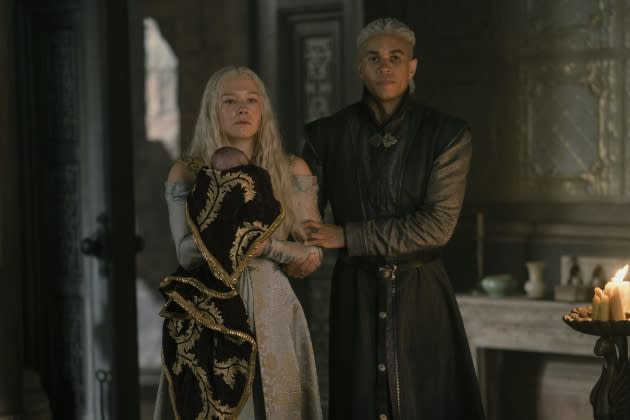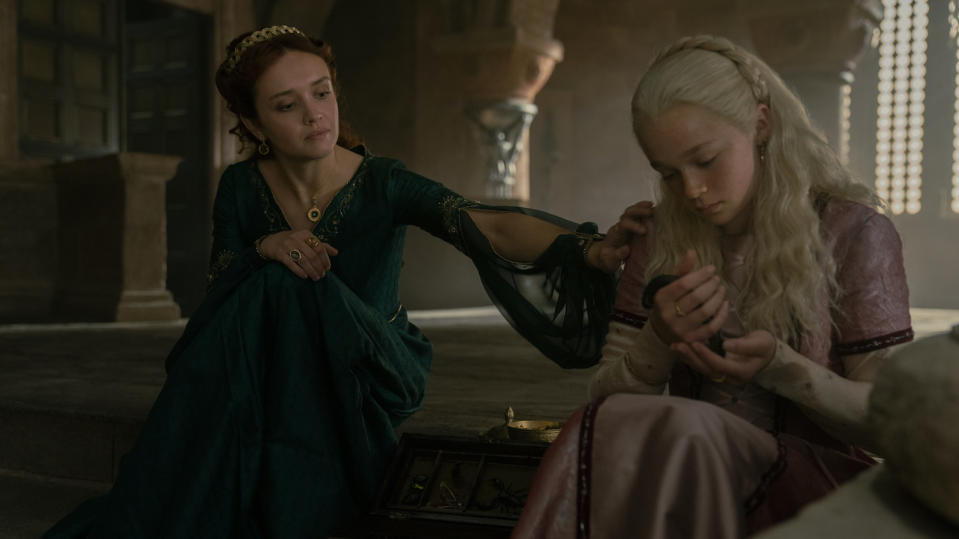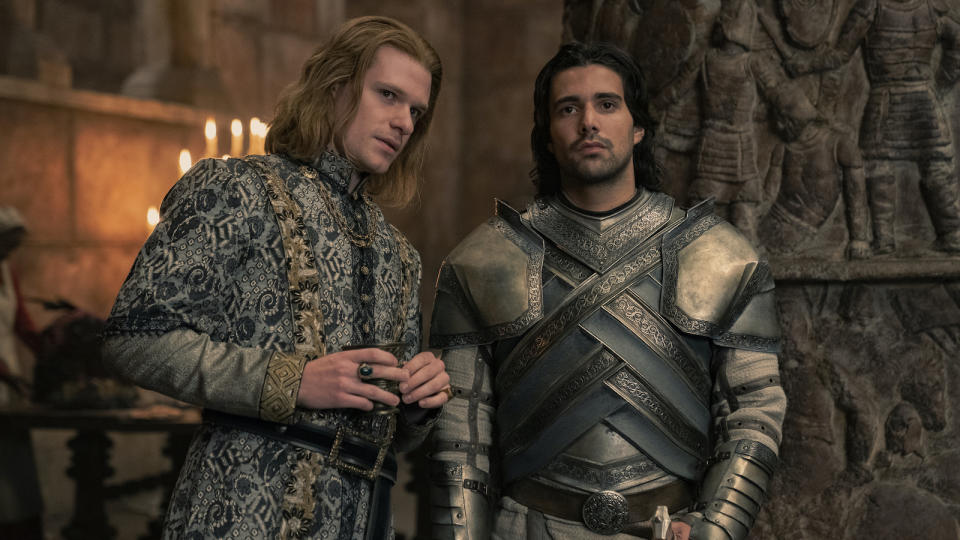‘House of the Dragon’ Showrunner on Episode 6’s Big Time Jump, the ‘Challenge’ of Filming Sex Scenes and Whether Young Rhaenyra and Alicent Will Return

SPOILER ALERT: This story discusses major plot developments in the first six episodes of “House of the Dragon,” currently airing on HBO and streaming on HBO Max.
If one of the big narrative challenges of “Game of Thrones” was managing the geographical sprawl of its many interweaving storylines, the challenge for the first season of its prequel series, “House of the Dragon,” is stretching the story of the civil war within the Targaryen family over multiple decades. George R.R. Martin’s bestselling book about the conflagration, “Fire & Blood,” spans generations — children are born and grow into adulthood within the two warring factions of Princess Rhaenyra Targaryen and her former best friend turned stepmother, Queen Alicent Hightower.
More from Variety
To wrangle that story into shape for a TV series, showrunners Ryan Condal and Miguel Sapochnik decided to cast the roles of Rhaenyra and Alicent twice, with Milly Alcock and Emily Carey, respectively, playing them as teenagers for the first five episodes, and Emma D’Arcy and Olivia Cooke as adults.
Episode 6, “The Princess and the Queen,” marks D’Arcy and Cooke’s debuts in the roles, opening with a harrowing sequence set 10 years after Episode 5, in which Rhaenyra gives birth to her third child and then immediately walks the newborn to Queen Alicent after the latter demands to see the child. It seems all of Rhaenyra’s children have been born, not with silver like hers and her husband’s, Laenor Velaryon (John MacMillan), but with brown hair — like that of Ser Harwin Strong (Ryan Core), one of Rhaenyra’s closest confidants.
The confrontation makes for a gripping introduction to D’Arcy and Cooke’s approach to the roles, but many “HotD” fans have also wondered if this is truly the last we’ll see of Alcock and Carey.
“I mean, look, I don’t know,” Condal tells Variety. Condal — who will be the sole showrunner for “House of the Dragon” after Sapochnik elected to step away after Season 1 — says that his writing team has broken much of Season 2, and the younger versions of Rhaenyra and Alicent “are not a part of the story that we’re telling, yet. That’s not a thing that we’re doing right now.”
However, Condal adds that while “‘Game of Thrones’ was not a flashback show,” his show can get “a little bit more fancy” with its narrative approach. And “Thrones” did on rare occasion dip into flashbacks, most often during Bran’s temporal sojourns as the Three Eyed Raven. So Condal wants to keep his options open on whether “House of the Dragon” will ever see Alcock and Carey back as Rhaenyra and Alicent.
“There are things that we haven’t fully sorted out,” he says. “I’m not closing the door on anything. So there, how’s that for an answer?”
One thing Condal is clear on: Don’t expect any major time jumps in Season 2. Following Season 1, “The storytelling becomes fairly in the rhythms of the original ‘Game of Thrones’ series,” he says.
Speaking with Variety just past the halfway point for Season 1 of “HotD,” Condal seems as relaxed and congenial as one could possibly expect of a person who’s successfully launched the follow-up series to one of the most successful TV shows of all time. As of Sept. 20, “House of the Dragon” is averaging 29 million viewers per episode, and its audience has been more-or-less steadily rising week-to-week.
As with its predecessor, the rabid popularity of “House of the Dragon” has also placed it under an occasionally harsh spotlight. After the gruesome death of Laenor’s male lover, Ser Joffrey Monmouth (Solly McLeod), at the hands of Rhaenyra’s spurned lover, Ser Criston Cole (Fabien Frankel) in Episode 5, several outlets published stories questioning whether the show had a “Bury Your Gays” problem (followed by a backlash to the backlash). Condal gamely addressed that issue, as well as the show’s careful approach to sexual violence, how the writers thought about the time jump between Episode 5 and 6 — and the fiery death in Episode 6 of Laena Velaryon (Nanna Blondell), the second wife of Rhaenyra’s uncle (and almost lover!) Daemon (Matt Smith).

What connective tissue did you want to have between the older and younger actors playing Rhaenyra and Alicent?
We wanted them to look similar enough that it wasn’t one of these tropes where you’re just meant to believe that that’s the same person. But ultimately, we needed great actors. It was definitely a process. As great as Emma D’Arcy and Olivia Cooke are, they were not the people that were going to begin the story. It was definitely a thing that we stressed over a lot. I think we succeeded. All four of them brought a tremendous performance to the show. I’m really proud of all of them.
What did you make of so many fans appearing to ‘ship Rhaenyra and her uncle Daemon, given the incest of it all?
I mean, nothing surprises me these days. I really didn’t know what people were going to make of that at all. Look, it’s part of the story, and I think that’s what makes it fascinating, because it sort of is taboo in a way and in our modern sensibility.
Quite taboo! Quite!
Well, yeah. It’s even pretty taboo as far as “Game of Thrones” goes, maybe not for — well, I think even so for Targaryens, because it’s different generations. But, yeah, it’s amazing what a great performance can do to make people accept things about a character. That’s credit to Matt and Milly, and soon, I think, to Matt and Emma, because you’ll see they also have a complex relationship. But look, I mean, I went back to “Back to the Future,” which is just like, you know, Marty goes to the prom with his mom and you’re kind of creeped out about it, but also you’re kind of like, “Huh! These are two good looking people. Are they’re going to make out tonight?!” Look, it’s not your uncle. So, you know, I guess people are OK with it, or the original series did enough groundwork to normalize Targaryen mating rituals that we don’t have to worry about it.
What Daemon does to young Rhaenyra is, in modern terminology, an act of abuse. And, as a traumatic event would, it shapes who Rhaenyra becomes.
Did you always know that you wanted to start Episode 6 with Rhaenyra giving birth?
Yes. That was conceived very early on in the writers’ room. The death of her mother in the pilot is the real underlying psychological reason Rhaenyra does not want to get married, because she’s terrified of going the way that her mother did. To drop in on her giving birth — knowing that the last birth the audience has seen has gone terribly wrong — was an incredibly tense and visceral way to begin the story, to get you in with Rhaenyra, to make you hopefully connect with her and care about her, and also to communicate that a ton of time and story distance has passed since the last time we saw her.
How did you decide either side of the 10-year time jump, where you were going to leave the story and then come back to it?
Those things happen, I think, organically over the storytelling process. The moment with [Alicent in] the green dress at the pre-wedding ceremony was the dividing line between Rhaenyra and Alicent. Rhaenyra lied and got Alicent’s dad fired. Alicent backed her and vouched for her to the king, and it blew up in her face. She’s played the role of the good servant all the way along. This is her coming out, saying, “I am House Hightower, and I now stand for myself.” So we knew that’s where we wanted to end it.
Then jumping forward to this new time period felt like the right thing to do. A lot of the storytelling that happens in 6 — which is done brilliantly by Sara Hess, who wrote the script, and Miguel, who directed it — is being told in the things that you’re not seeing happen and the characters who are now there and the characters who are missing. All of these things imply the passage of time, and I think a smart audience who is leaning forward and paying attention will pick up on those things and understand quite a bit has changed since last we left these characters.
The question of the parentage of Rhaenyra’s children is left kind of ambiguous in the book. But it seems pretty clear on the show that Laenor is not their father. Is that how should we should be reading it?
Well, take from it what you will, but I think it becomes a major part of the storytelling. That’s a great example of the reason why we took the time to tell those five stories with the younger cast, because it lays all the groundwork so you understand why Rhaenyra is in the place that she’s in. You know who Laenor is. You know a little bit about Harwin Strong and Rhaenyra. And certainly you know now who Alicent Hightower and Viserys are. Rhaenyra still has a lot of the devil-may-care qualities as she did in her youth. Alicent remains this very steadfast woman of duty. All those things can now play together in a much higher stakes sandbox than where we left them when they were younger.
In the book, Laenor’s sister, Laena Velaryon, dies in a much more conventional way, in complications from childbirth. How did you arrive at the decision to have Laena order her dragon set her on fire because she couldn’t deliver her baby?
Laena’s a valkyrie. She’s a dragon rider. We met that little girl back in Episode 2; that little girl went on a couple years later to claim the biggest dragon in the world. It felt like she wouldn’t want to go out the way that the history book said. Unfortunately, because of the nature of the season and the storytelling, we didn’t get to spend as much time as I think we would have preferred to with Laena. We had to keep the story moving. So we wanted to give her a memorable out that felt active and in her character. Even though we’re only with Nanna Blondell’s portrayal of her for a very brief time, within that moment, it tells you a lot about who Laena is and was.

There also were several articles following Episode 5 that criticized Criston Cole’s rather brutal murder of Laenor’s boyfriend, Joffrey, as an example of the “Bury Your Gays” trope. How do you feel about that reaction?
I mean, people are going to react how they’re going to react. First of all, that was the story in the book. It was handled, again, slightly differently: Joffrey is murdered by Criston Cole out of a jealous, wounded rage at a tournament. We just had him do it out in the open, and watch Cole’s frustration over the slight that he feels like he’s been levied with. It’s a brutal world. It’s a violent world. Cole has exposed himself, I think, as a certain kind of character. It wasn’t done without thought. I know people are going to react as they react, but, you know, that’s the story we’re telling.
Were you aware of that “Bury Your Gays” pitfall — that that’s a thing that people are aware of and concerned about?
Probably vaguely. I mean, I try not to read the internet. I live in my own storytelling world so that I’m not affected by these things, so I feel free to tell the story. But look, there are lots of interesting characters in the show. People come in and come out of this world all the time. There’s more interesting characters to come. So I would just say, stay tuned.
Emily Carey said in an interview that before they got to the set and met the intimacy coordinator, they were scared of doing sex scenes on “House of the Dragon” because of how sexually violent “Game of Thrones” had been. Was that something that you and Miguel were aware was in the air as you were casting, writing and preparing the show?
Yeah. Those scenes are always a challenge. I’m uncomfortable writing them, to be honest with you. But sometimes it’s necessary to tell the story. We always come back to: Is this a necessary thing to reveal character, to tell a certain story point? I think we’ve been really restrained in the making of the show — that those kinds of scenes have never been done to titillate. It’s always been done with a purpose to either reveal character or to reveal the world or to tell a bit of story.
Viserys married a much younger woman, essentially the childhood friend of his daughter. We felt it was important to see the outcome of that. We had female directors on the show; one of them directed that particular scene. Sara Hess is my writing partner on the show. There were lots of female voices involved in the decision-making there, and it was actually the women who were really pushing for it: “No, we have to see it, because we have to make the audience feel the actual results of this kind of political scheming and what that actually means — but do it in a way that protects the actors and is, again, not titillating.”
How does that work on the day?
We bring in an intimacy coordinator. Those scenes were heavily rehearsed beforehand. The actors get to voice any concerns that they would have about being uncomfortable or being taken care of. I followed up with everybody throughout that process and I was always getting feedback from them that they felt safe and protected and cared for. The big thing, at least in my experience, with intimate scenes, is that the actors understand that it’s part of the job, but they want to know what they’re walking into. We put a lot of effort and thought into that. I’m proud of what we did, and I just hope our cast felt as taken care of as we tried to make them.
When did Miguel Sapochnik tell you he was going to be moving on from the show?
We had a conversation in the summer — right around when the show premiered. I knew it was something that he was wrestling with. He doesn’t have anything left to prove in Westeros, I don’t think. He’s shot every kind of battle: good and evil, light and dark, fantasy and not fantasy, dragon and no dragon. He’s said what he has to say in Westeros. I knew that it was always a possibility that he was going to do one season, get this thing on its feet [and] be proud of having a hand in the actual creation of a “Game of Thrones” story. It was lingering in the back of my mind, knowing how much is involved with doing another season of the show, would he want to get up on the horse again? I was really bummed. He’s tremendously talented. And I’m really proud of the work that we did. But I’m excited to see what he’s got in store now.
How are you feeling about being the only showrunner for Season 2?
[Deep exhale.] It’s a lot. It’s one of those things where, like, I’ve heard presidents say that they always have more trepidation about their second term than their first because they know the job that they’re going into. I definitely am not comparing this job to the presidency at all. But it’s lonely at the top, and now I find myself alone at the top. Thankfully, I have a wonderful team around me. I’m excited for the story that we’re going to tell in Season 2. There are thousands of people that go into the making of this. It’s on me to be able to be a great leader and try to inspire people, hopefully with some good writing, to get the very best work out of them and make another great season of the show.
By all reports, the show is doing enormously well. At this stage of the season, are you able to celebrate that success? How does it feel to have met or even exceeded the expectations?
It feels good. I’ve been doing this job for 15 years. I’ve never been involved with anything even remotely like this. It’s pretty crazy. It is hard to celebrate, because it is so intense and all consuming. Season 1 has really folded over on Season 2. We’ve been writing Season 2 for months, through post and premieres and press. So there’s not really a moment to take stock and go to some Mediterranean island and stand and look off into the sunset, proud of your work. Maybe that day will come, but not today.
This interview has been edited and condensed.
Best of Variety
13 Supporting Actors Who Successfully Campaigned for Lead Categories at the Oscars
Your Pet Can Be Anyone They Want This Halloween, From Maverick to Winifred Sanderson
From Maverick and Rooster to Vecna and Eleven: The Best Couples Costumes to Wear This Halloween
Sign up for Variety’s Newsletter. For the latest news, follow us on Facebook, Twitter, and Instagram.


